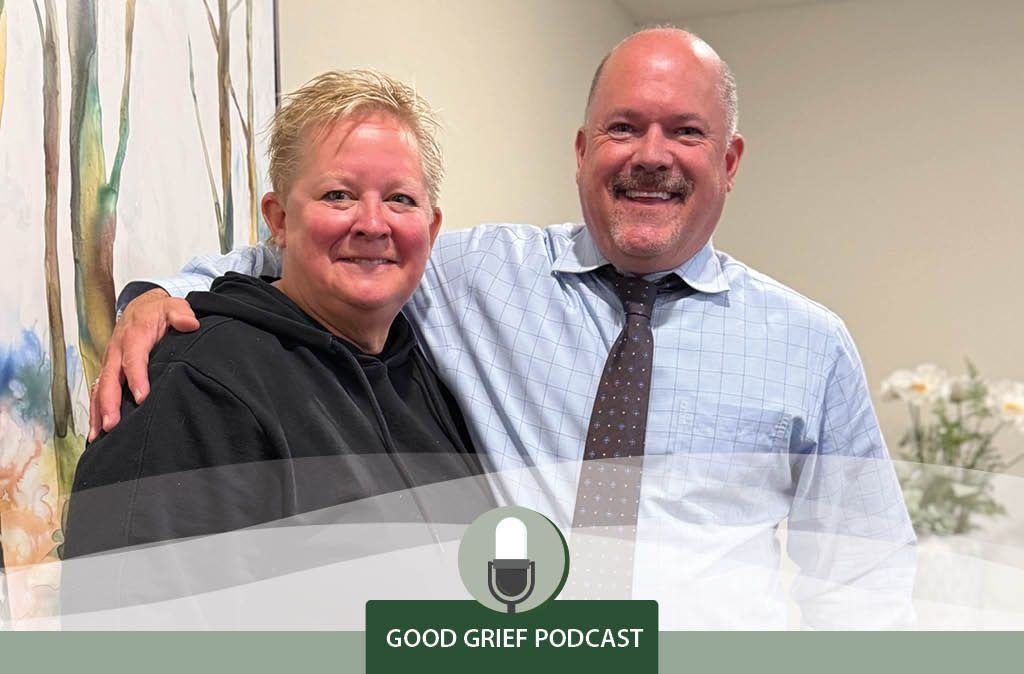Grief in the Family System
Episode Description:

In this powerful episode, Rev. Dr. Jules Erickson joins Michael O’Connell for a deep and relatable conversation about how grief moves through families—and how we often carry it without even knowing.
From childhood loss and moral injury to the messy middle of healing, Pastor Jules shares stories and tools from family systems theory and pastoral work. You'll learn why grief doesn't follow a straight line, how anxiety and shame often mask our deeper pain, and how sitting with discomfort is sometimes the most healing thing we can do.
This is a must-listen for anyone grieving or walking beside someone who is—and for those who want to better understand how grief shapes who we are within our families.
Top Takeaways from the Episode
- Grief doesn’t follow stages—it’s nonlinear and messy.
Pastor Jules compares it to silly string: unpredictable and different for everyone.
- Family systems absorb grief collectively.
When a key family figure dies, it disrupts the emotional balance—and may take five to seven years to restore.
- Everyone grieves differently depending on their role in the family.
Oldest, middle, and youngest siblings often carry distinct emotional responsibilities based on their place in the family structure.
- Unresolved grief gets stored in the body.
Grief and trauma can live physically in us—leading to reactivation through future events or emotional triggers.
- Grief thrives in isolation; healing requires connection.
Jules emphasizes the power of community, support, and even therapy tools like EMDR to help process pain.
- Many people confuse guilt with shame.
Understanding the difference is essential to healing:
- Guilt = “I did something wrong.”
- Shame = “I am something wrong.”
- We’re addicted to anxiety.
From phones to overfunctioning, many modern habits are rooted in trying to soothe inner chaos with distraction.
- Church can be a safe space—if it's real.
Jules shares how vulnerability, authenticity, and even laughter are core parts of her ministry and the healing process.
- Your story about your pain isn’t always the truth.
Writing out your story and examining it can help you identify what’s real and what may be self-protective or distorted.
- Healing isn’t linear—it requires sitting in discomfort.
The “messy middle” between loss and new beginnings is where deep transformation and personal growth truly happen.
🎧 EPISODE HIGHLIGHTS
(00:46) The myth of “five stages” of grief
(04:55) What “foreboding joy” teaches us about loss
(09:02) Trauma, triggers, and how the body keeps the score
(14:35) What happens when a matriarch or patriarch dies
(21:10) Are we addicted to anxiety? Why we self-soothe with phones, food, or distraction
(28:22) The dangers of unresolved shame
(34:00) Loving yourself: what it
actually means
(42:40) A pastor’s boundary: being present without absorbing every burden
(48:33) “I didn’t want to tell you because I didn’t want to get it on you”
(55:05) The messy middle of grief—and why we resist it
(01:02:00) Final takeaway: Show up. Do good. Be kind.
Resources Mentioned
- On Death and Dying by Elisabeth Kübler-Ross
- Atlas of the Heart by Brené Brown
- The Body Keeps the Score by Bessel van der Kolk
- Ambiguous Loss by Pauline Boss
- Failure of Nerve by Edwin Friedman
- Self-Compassion.org by Kristin Neff
- Know Your Roots with Henry Louis Gates Jr. (PBS)
- Managing Transitions by William Bridges
Memorable Quotes
Pastor Jules Erickson
- “Grief is like silly string—it never goes in a straight line.”
- “We don’t preach open wounds—we preach scars.”
- “We’re as sick as our secrets.”
- “Grief in the family system creates imbalance until someone steps in.”
- “You are worthwhile, you are loved for free, and you are enough.”
- “People are walking around dead—we need to wake up and care for each other.”
- “Put down your phones and go play tag football in the backyard.”
- “The messy middle is where the healing happens.”
Michael O’Connell
- “It's not your fault—but it is your responsibility to change the course.”
- “Some days, grief feels like carrying 150 pounds you didn’t know you were holding.”
- “Even when I didn’t feel it, I had to say out loud—I am enough.”
- “Behind the suit and tie, people can be broken.”
- “You can’t receive love if you don’t believe you’re worthy of it.”


